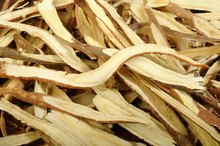Can Turmeric Affect Your Blood Pressure?
If left uncontrolled, high blood pressure increases risk of heart attack, stroke and kidney failure, and may even lead to death (see reference 1 para 1). In a majority of cases, anti-hypertensive medication is the most effective and primary mode of treatment for high blood pressure (see reference 1 para 4). Currently, there is no consistent evidence to suggest that turmeric is helpful in treating blood pressure.
Turmeric and Blood Pressure
Turmeric is a bitter yellow spice used in folk medicine as a remedy for a number of different ailments, including heartburn, gallstones, peptic ulcers and cancer (see reference 2 under Introduction para 3). Animal studies indicate that the active ingredient in turmeric, curcumin, may have anti-inflammatory and antioxidant properties. As for blood pressure, an October 2011 study published in "Nutrition and Metabolism" found that curcumin improved blood pressure in chemically-induced hypertensive rats (see reference 4 under Results under blood pressure para 2). However, human studies need to be conducted to verify the potential benefits.
- Turmeric is a bitter yellow spice used in folk medicine as a remedy for a number of different ailments, including heartburn, gallstones, peptic ulcers and cancer (see reference 2 under Introduction para 3).
- As for blood pressure, an October 2011 study published in "Nutrition and Metabolism" found that curcumin improved blood pressure in chemically-induced hypertensive rats (see reference 4 under Results under blood pressure para 2).
Concerns and Warnings
Turmeric Toxicity
Learn More
Turmeric is a spice and considered safe to consume by most adults, according to the National Center for Complementary and Integrative Health (see reference 2 under Side Effects and Cautions). However, consuming too much has caused indigestion, nausea and diarrhea (see reference 2 under Side Effects and Cautions bullet point 2). It's also important to note that high doses have lead to liver problems in animals, but there have been no reports of liver problems in people (see reference 2 under Side Effects and Cautions bullet point 3). Additionally, if you have gallbladder disease you should not take turmeric supplements (see reference 2 under Side Effects and Cautions bullet point 3). Always consult with your doctor before adding alternative therapies to your health regimen.
- Turmeric is a spice and considered safe to consume by most adults, according to the National Center for Complementary and Integrative Health (see reference 2 under Side Effects and Cautions).
- However, consuming too much has caused indigestion, nausea and diarrhea (see reference 2 under Side Effects and Cautions bullet point 2).
Related Articles
References
- Journal of the American Medical Association: 2014 Evidence-Based Guideline for the Management of High Blood Pressure in Adults
- National Center For Complimentary and Integrative Health
- Official Publication of the College of Family Physicians of Canada: Complementary and Alternative Medicine Approaches to Blood Pressure Reduction
- Nutrition and Metabolism: Spice Up the Hypertension Diet - Curcumin and Piperine Prevent Remodeling of Aorta in Experimental L-NAME Induced Hypetension
- National Center for Complementary and Integrative Health (NCCIH). Turmeric. Updated November 27, 2018.
- Gupta SC, Patchva S, Aggarwal BB. Therapeutic roles of curcumin: lessons learned from clinical trials. AAPS J. 2013;15(1):195-218. doi:10.1208/s12248-012-9432-8
- Daily JW, Yang M, Park S. Efficacy of turmeric extracts and curcumin for alleviating the symptoms of joint arthritis: a systematic review and meta-analysis of randomized clinical trials. J Med Food. 2016;19(8):717-29. doi:10.1089/jmf.2016.3705
- Hewlings SJ, Kalman DS. Curcumin: A review of its effects on human health. Foods. 2017;6(10). doi:10.3390/foods6100092
- Cavaleri F. Presenting a new standard drug model for turmeric and its prized extract, curcumin. Int J Inflam. 2018;2018:5023429.
- Khayat S, Fanaei H, Kheirkhah M, Moghadam ZB, Kasaeian A, Javadimehr M. Curcumin attenuates severity of premenstrual syndrome symptoms: a randomized, double-blind, placebo-controlled trial. Complement Ther Med. 2015;23(3):318-24. doi:10.1016/j.ctim.2015.04.001
- Maulina T, Diana H, Cahyanto A, Amaliya A. The efficacy of curcumin in managing acute inflammation pain on the post-surgical removal of impacted third molars patients: a randomised controlled trial. J Oral Rehabil. 2018;45(9):677-683. doi:10.1111/joor.12679
- Buhrmann C, Mobasheri A, Busch F, et al. Curcumin modulates nuclear factor kappaB (NF-kappaB)-mediated inflammation in human tenocytes in vitro: role of the phosphatidylinositol 3-kinase/Akt pathway. J Biol Chem. 2011;286(32):28556-66. doi:10.1074/jbc.M111.256180
- Fusar-poli L, Vozza L, Gabbiadini A, et al. Curcumin for depression: a meta-analysis. Crit Rev Food Sci Nutr. 2019;1-11. doi:10.1080/10408398.2019.1653260
- Kunnumakkara AB, Bordoloi D, Padmavathi G, et al. Curcumin, the golden nutraceutical: multitargeting for multiple chronic diseases. Br J Pharmacol. 2017;174(11):1325-1348. doi:10.1111/bph.13621
- Burge K, Gunasekaran A, Eckert J, Chaaban H. Curcumin and intestinal inflammatory diseases: molecular mechanisms of protection. Int J Mol Sci. 2019;20(8). doi:10.3390/ijms20081912
- Bai X, Oberley-deegan RE, Bai A, et al. Curcumin enhances human macrophage control of Mycobacterium tuberculosis infection. Respirology. 2016;21(5):951-7. doi:10.1111/resp.12762
- Lee SW, Nah SS, Byon JS, et al. Transient complete atrioventricular block associated with curcumin intake. Int J Cardiol. 2011;150(2):e50-2. doi:10.1016/j.ijcard.2009.09.530
- Milton S. Hershey Medical Center. Possible interactions with: turmeric. Updated January 5, 2015.
- American Academy of Allergy, Asthma & Immunology. Can spices cause allergic reactions?
- Tayyem RF, Heath DD, Al-delaimy WK, Rock CL. Curcumin content of turmeric and curry powders. Nutr Cancer. 2006;55(2):126-31. doi:10.1207/s15327914nc5502_2
- Gupta SC, Kismali G, Aggarwal BB. Curcumin, a component of turmeric: from farm to pharmacy. Biofactors. 2013 Jan-Feb;39(1):2-13. DOI: 10.1002/biof.1079.
- Gupta SC, Patchva S, Koh W, Aggarwal BB. Discovery of curcumin, a component of golden spice, and its miraculous biological activities. Clin Exp Pharmacol Physiol. 2012 Mar;39(3):283-99. DOI: 10.1111/j.1440-1681.2011.05648.x.
- Patrick K, Stanbrook MB. Take turmeric with a grain of salt. CMAJ. 2018;190(43):E1270. doi:10.1503/cmaj.181358
Writer Bio
A freelance writer and blogger since 2007, Shamala Pulugurtha's work has appeared in magazines such as the "Guide to Health and Healing" and prominent websites like Brain Blogger and NAMI California. Pulugurtha has a postgraduate degree in medical microbiology from Manipal Academy of Higher Education, India and has completed course work in psychology and health education.









